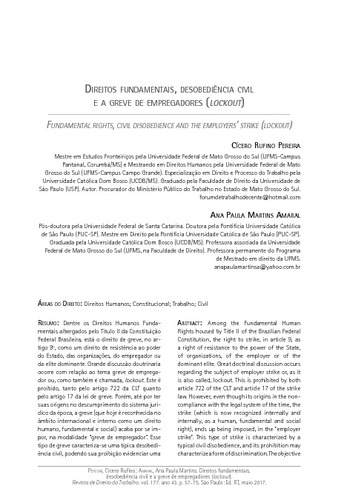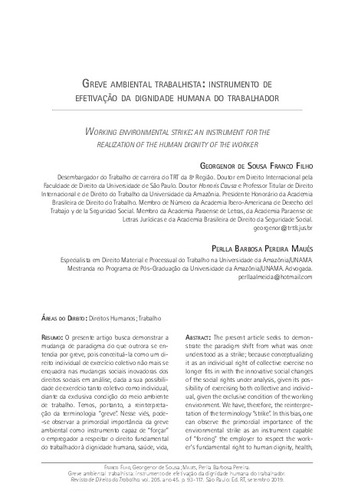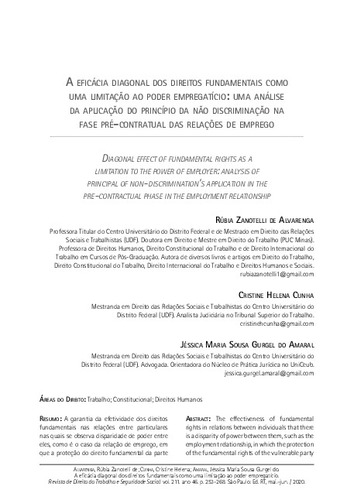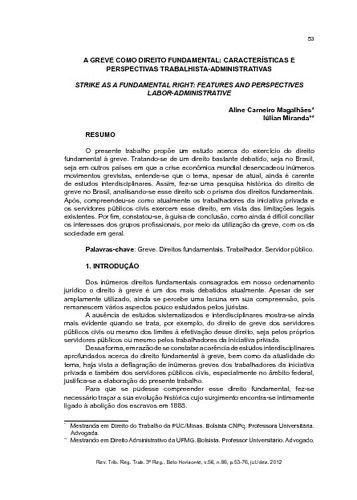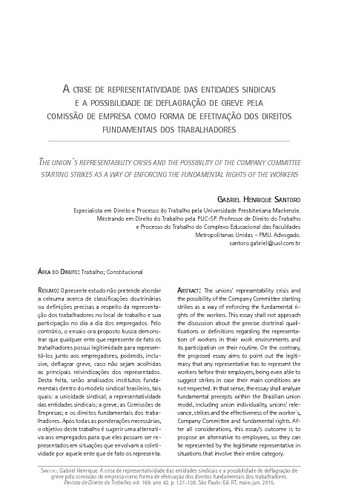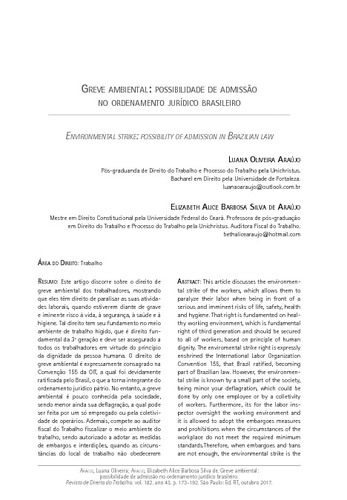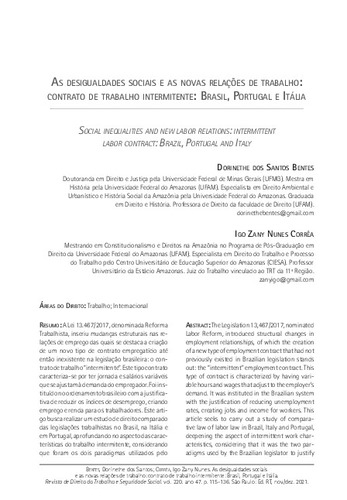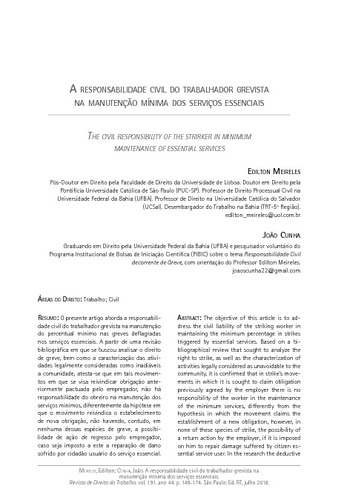Artigo de periódico
Direitos fundamentais, desobediência civil e a greve de empregadores (lockout)
| dc.contributor.author | Pereira, Cícero Rufino | |
| dc.contributor.author | Amaral, Ana Paula Martins | |
| dc.date.accessioned | 2017-06-22T13:04:26Z | |
| dc.date.available | 2017-06-22T13:04:26Z | |
| dc.date.issued | 2017-05 | |
| dc.identifier.citation | PEREIRA, Cícero Rufino; AMARAL, Ana Paula Martins. Direitos fundamentais, desobediência civil e a greve de empregadores (lockout) = Fundamental rights, civil disobedience and the employers strike (lockout). Revista de direito do trabalho, São Paulo, v. 43, n. 177, p. 57-75, maio 2017. | pt_BR |
| dc.identifier.uri | https://hdl.handle.net/20.500.12178/106273 | |
| dc.description.abstract | [por] Entre os Direitos Humanos Fundamentais albergados pelo Título II da Constituição Federal Brasileira, está o direito de greve, no artigo 9º, como um direito de resistência ao poder do Estado, das organizações, do empregador ou da elite dominante. Grande discussão doutrinaria ocorre com relação ao tema greve de empregador ou, como também é chamada, lockout. Este é proibido, tanto pelo artigo 722 da CLT quanto pelo artigo 17 da lei de greve. Porém, até por ter suas origens no descumprimento do sistema jurídico da época, a greve (que hoje é reconhecida no âmbito internacional e interno como um direito humano, fundamental e social) acaba por se impor, na modalidade "greve de empregador". Esse tipo de greve caracteriza-se uma típica desobediência civil, podendo sua proibição evidenciar uma forma de discriminação. O objetivo do estudo é discutir tais temas. Metodologicamente, foram utiliza os procedimentos de pesquisa e revisão bib iográfica, com relação às categorias conceituais direito humanos, direitos fundamentais, desobediência ci il, greve e discriminação. | pt_BR |
| dc.description.abstract | [eng] Among the Fundamental Human Rights housed by Title II of the Brazilian Federal Constitution, the right to strike, in article 9, as a right of resistance to the power of the State, of organizations, of the employer or of the dominant elite. Great doctrinal discussion occurs regarding the subject of employer strike or, as it is also called, lockout. This is prohibited by both article 722 of the CLT and article 17 of the strike law. However, even though its origins in the noncompliance with the legal system of the time, the strike (which is now recognized internally and internally, as a human, fundamental and social right), ends up being imposed, in the "employer strike". This type of strike is characterized by a typical civil disobedience, and its prohibition may characterize a form of discrimination. The objective of the present study. Methodologically, research and bibliographic review procedures were used, with reference to the conceptual categories human rights, fundamental rights, civil disobedience, strikes and discrimination. | pt_BR |
| dc.language.iso | pt_BR | pt_BR |
| dc.relation.ispartof | Revista de direito do trabalho: vol. 43, n. 177 (maio 2017) | pt_BR |
| dc.subject | Locaute, Brasil | pt_BR |
| dc.subject | Direito de greve, Brasil | pt_BR |
| dc.subject | Empregador, Brasil | pt_BR |
| dc.subject | Desobediência civil, Brasil | pt_BR |
| dc.title | Direitos fundamentais, desobediência civil e a greve de empregadores (lockout) | pt_BR |
| dc.title.alternative | Fundamental rights, civil disobedience and the employers strike (lockout) | pt_BR |
| dc.relation.references | Brasil. Consolidação das leis do trabalho (CLT) (1943), art. 722 | pt_BR |
| dc.relation.references | Art. 17 da Lei de greve, aprovada pela Lei n. 7783, de 28 de junho de 1989 | pt_BR |
| dc.type.genre | Artigo de periódico | pt_BR |
| dc.identifier.rvbisys | 001098143 | |
| dc.relation.ispartoflink | https://hdl.handle.net/20.500.12178/105327 | pt_BR |
| dc.relation.referenceslink | http://www.lexml.gov.br/urn/urn:lex:br:federal:decreto.lei:1943-05-01;5452 | pt_BR |
| dc.relation.referenceslink | http://www.lexml.gov.br/urn/urn:lex:br:federal:lei:1989-06-28;7783 | pt_BR |
Coleção
-
Artigos9566


